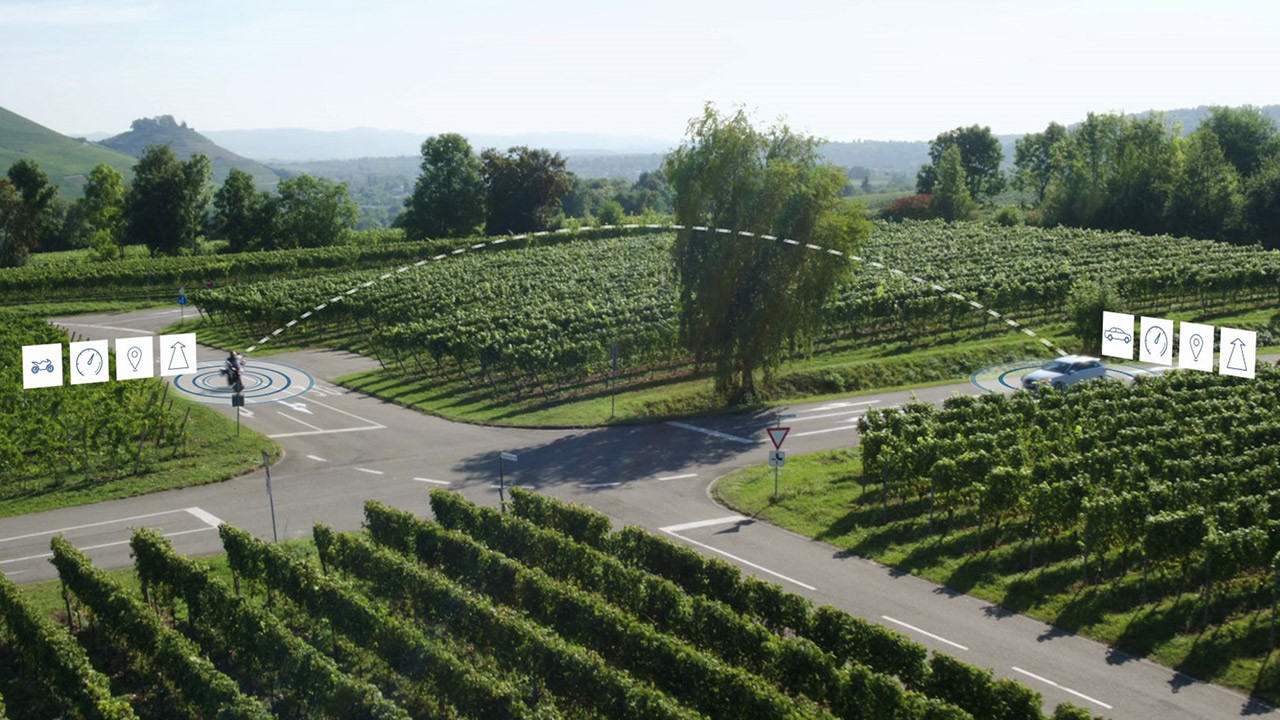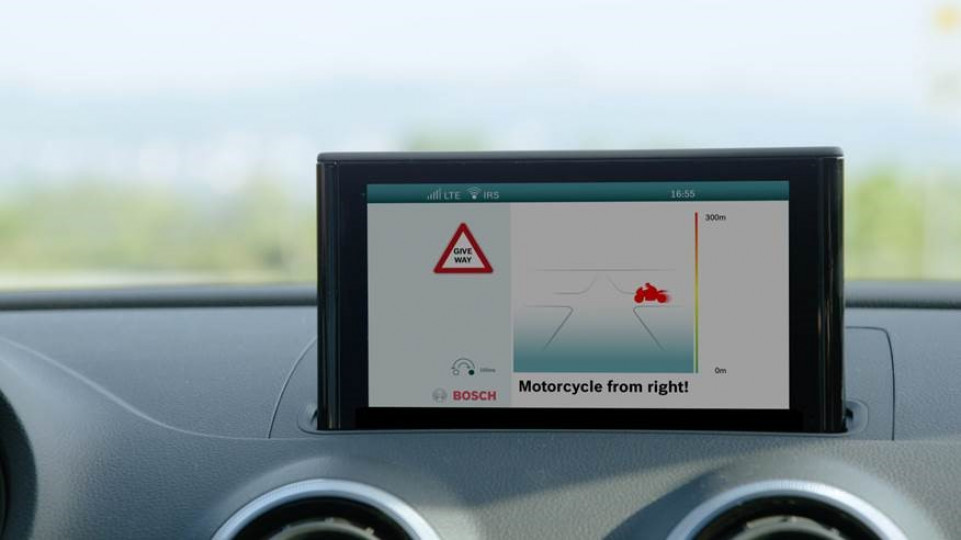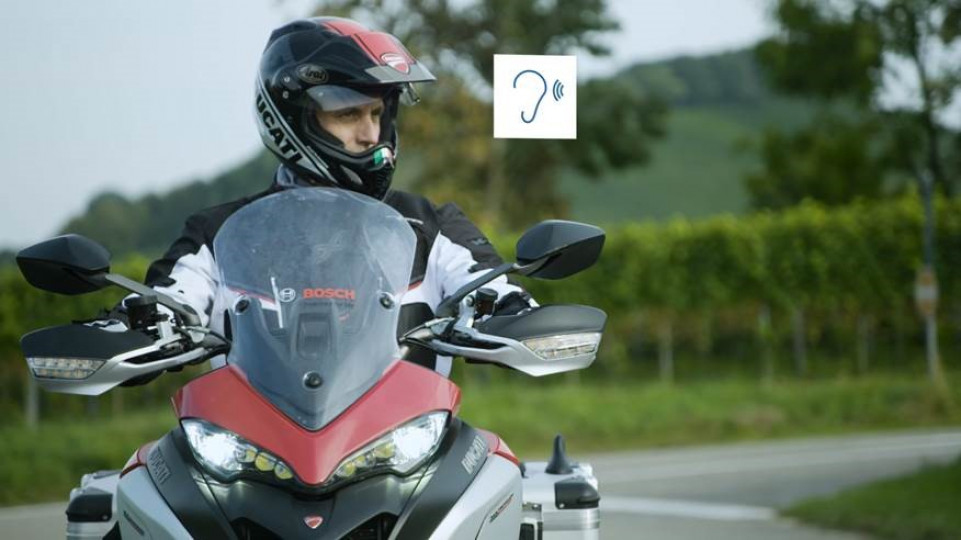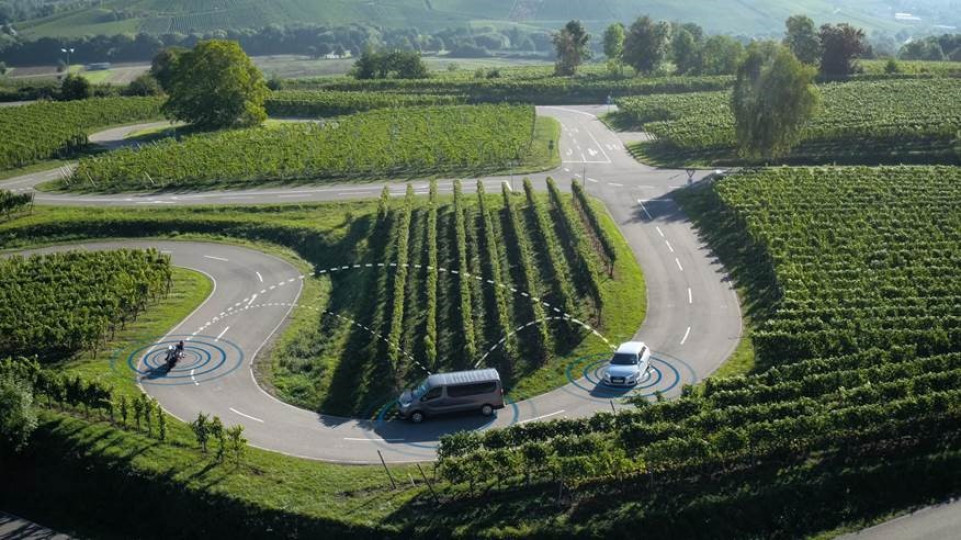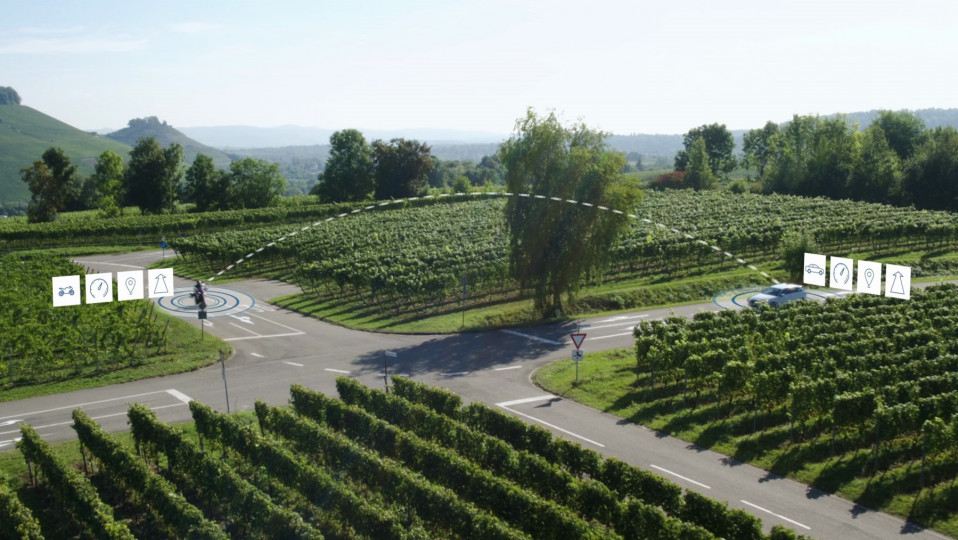Stuttgart – Whether smart assistance systems, connectivity solutions, or new energy for the powertrain: Bosch has the right solutions for the motorcycles of the future.
Connectivity systems: connected solutions for more convenience
Motorcycle-to-car communication: Up to ten times a second, vehicles within a radius of several hundred meters exchange information about vehicle types, speed, position, and direction of travel. Long before drivers or their vehicles’ sensors catch sight of a motorcycle, this technology informs them that a motorcycle is approaching, allowing them to adopt a more defensive driving strategy. The public WLAN standard (ITS G5) is used as the basis for the exchange of data between motorcycles and cars. Transmission times of just a few milliseconds between transmitter and receiver mean that participating road users can generate and transmit important information relating to the traffic situation.
Integrated connectivity cluster: The ICC integrated connectivity cluster is a rider information system developed especially for motorcycles that features variable display sizes and resolutions. Thanks to the latest technology, it is easy to read in all situation. Along with a Bluetooth interface, the ICC features the mySPIN smartphone integration solution. This connects the smartphone with the vehicle and means apps can be controlled via the ICC. In addition, riders can view dynamic trip and vehicle data such as route details, their lean angle, and their speed in bends.
Connected Horizon: With the Connected Horizon from Bosch motorcyclist are able to look around the corner and react to possible danger areas on time. Data from the internet provide real-time information about speed limitations, speed in bends, danger areas and the location of traffic jams, construction sites, and accidents. This data will give motorcyclist an even better picture of what lies ahead – further increasing safety and comfort.
Emergency Call, Breakdown Call and Information Call: On the basis of intelligent crash algorithms the eCall automatically contacts emergency services if the rider is involved in an accident and transmits vehicle data as well as position to the emergency call headquarters. In the event that the two-wheeler breaks down, the bCall independently contacts the repair shop and sends the necessary data. The iCall is a helpful assistant on every road. This makes accessing service information – such as the location of the nearest gas station – simple and straightforward.
Assistance systems: greater safety on two wheels
MSC motorcycle stability control: MSC motorcycle stability control is a type of ESP for motorcycles. By monitoring two-wheeler parameters such as lean angle, the system can instantaneously adjust its electronic braking and acceleration interventions to suit the current riding status. In this way, the Bosch system can prevent the bike from lowsiding or righting itself when braking in bends, which is where the majority of motorcycle accidents occur.
Vehicle hold control: Bosch makes handling heavy bikes easier with its vehicle hold control, an ABS value added function which is programmed into the ABS control unit by means of smart algorithms. By preventing the bike from rolling away when it comes to a stop on an incline or a flat surface, this function saves the rider from having to continuously engage the hand or foot brake. The value added function function works on the basis of Bosch’s ABS enhanced with electronic combining braking system, which is also the basis for Bosch’s MSC enhanced, the motorcycle stability control.
Powertrain systems and electrification: Greater efficiency and a more enjoyable ride
Electronic engine management: In combination with highly developed sensor technology, engine management systems (EMS) achieve considerable increases in efficiency as against conventional carburetor systems and can reduce fuel consumption by up to 16 percent depending on the situation. This significantly reduces emissions and conserves valuable resources – without compromising the riding-fun. The control unit is at the core of the new engine management system. This small computer analyzes all the data from the powertrain: from the ignition to the amount of fuel.
Powertrain systems for light electric vehicles: With its integrated powertrain systems for light electric vehicles, Bosch is bringing resource-saving solutions to urban mobility. Two drive systems – one with an in-hub motor with a power range up to three kilowatts and one with a mid-drive motor for power ranges above four kilowatts – complement Bosch’s product range of electric motors up to 20 kilowatts. Motor, control unit, battery, charger, display, and app are synchronized with each other to form flexible, versatile systems for light electric vehicles. Thanks to the rapid acceleration, long range, and outstanding safety of this scalable powertrain system for light electric vehicles, Bosch is creating the technical basis for a long-lasting, enjoyable ride.
Mónika Hack
+36 70 510 5516
Mobility Solutions is the largest Bosch Group business sector. In 2016, its sales came to 43.9 billion euros, or 60 percent of total group sales. This makes the Bosch Group one of the leading automotive suppliers. The Mobility Solutions business sector combines the group’s expertise in three mobility domains – automation, electrification, and connectivity – and offers its customers integrated mobility solutions. Its main areas of activity are injection technology and powertrain peripherals for internal-combustion engines, diverse solutions for powertrain electrification, vehicle safety systems, driver-assistance and automated functions, technology for user-friendly infotainment as well as vehicle-to-vehicle and vehicle-to-infrastructure communication, repair-shop concepts, and technology and services for the automotive aftermarket. Bosch is synonymous with important automotive innovations, such as electronic engine management, the ESP anti-skid system, and common-rail diesel technology.
The Bosch Group is a leading global supplier of technology and services. It employs roughly 390,000 associates worldwide (as of December 31, 2016). The company generated sales of 73.1 billion euros in 2016. Its operations are divided into four business sectors: Mobility Solutions, Industrial Technology, Consumer Goods, and Energy and Building Technology. As a leading IoT company, Bosch offers innovative solutions for smart homes, smart cities, connected mobility, and connected manufacturing. It uses its expertise in sensor technology, software, and services, as well as its own IoT cloud, to offer its customers connected, cross-domain solutions from a single source. The Bosch Group’s strategic objective is to deliver innovations for a connected life. Bosch improves quality of life worldwide with products and services that are innovative and spark enthusiasm. In short, Bosch creates technology that is “Invented for life.” The Bosch Group comprises Robert Bosch GmbH and its roughly 440 subsidiaries and regional companies in some 60 countries. Including sales and service partners, Bosch’s global manufacturing and sales network covers nearly every country in the world. The basis for the company’s future growth is its innovative strength. At 120 locations across the globe, Bosch employs some 59,000 associates in research and development.
Additional information is available online at www.bosch.hu

